
A trick-taking game is a card or tile-based game in which play of a hand centers on a series of finite rounds or units of play, called tricks, which are each evaluated to determine a winner or taker of that trick. The object of such games then may be closely tied to the number of tricks taken, as in plain-trick games such as contract bridge, whist, and spades, or to the value of the cards contained in taken tricks, as in point-trick games such as pinochle, the tarot family, briscola, and most evasion games like hearts. Trick-and-draw games are trick-taking games in which the players can fill up their hands after each trick. In most variants, players are free to play any card into a trick in the first phase of the game, but must follow suit as soon as the stock is depleted. Trick-avoidance games like reversis or polignac are those in which the aim is to avoid taking some or all tricks.

Whist is a classic English trick-taking card game which was widely played in the 18th and 19th centuries. Although the rules are simple, there is scope for strategic play.
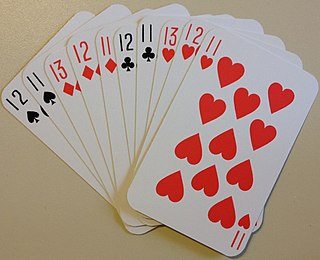
500 or Five Hundred is a trick-taking game developed in the United States from Euchre. Euchre was extended to a 10 card game with bidding and a Misere contract similar to Russian Preference, producing a good cut-throat three player game like Preference and a four player game played in partnerships like Whist which is the most popular modern form, although with special packs it can be played by up to six players. It arose in America before 1900 and was promoted by the US Playing Card Company, who copyrighted and marketed a deck with a set of rules in 1904. In 1906 the US Playing Card Company released the improved Avondale scoring table to remove bidding irregularities. 500 is a social card game and was highly popular in the United States until around 1920 when first auction bridge and then contract bridge drove it from favour. It continues to be popular in Ohio and Pennsylvania, where it has been taught through six generations community-wide, and in other countries: Australia, New Zealand, Canada and Shetland. Despite its American origin, 500 is the national card game of Australia.

Solo Whist, sometimes known as English Solo or simply Solo, is a trick-taking card game for four players. Despite the name it is not related to Whist, but derives from an early form of Boston played in the Low Countries, whose direct ancestor, in turn, was the 17th-century Spanish game of Ombre. Its major distinctive feature is that one player often plays against the other three. However, players form temporary alliances with two players playing against the other two if "Prop and Cop" is the current bid. It requires four players using a standard 52 card deck with no jokers. Aces are high and the deal, bidding and play are clockwise.

Ombre or l'Hombre is a fast-moving seventeenth-century trick-taking card game for three players and "the most successful card game ever invented."
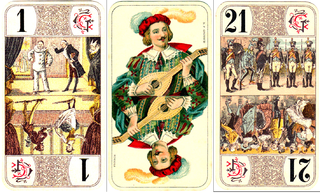
The game of French Tarot is a trick-taking strategy tarot card game played by three to five players using a traditional 78-card tarot deck. The game is the second most popular card game in France and is also played in French-speaking Canada.
Pedreaux is an American trick-taking card game of the All Fours family based on Auction Pitch. Its most popular variant is known as Cinch, Double Pedro or High Five. Developed in Houma, Louisiana, by Chris Levron and Brad Greco in the 1880s, it was soon regarded as the most important member of the All Fours family. Although it went out of fashion with the rise of Auction Bridge, it is still widely played on the western coast of the United States and in its southern states, being the dominant game in some locations in Louisiana. Forms of the game have been reported from Nicaragua, the Azores, Niobe NY, Italy and Finland. The game is primarily played by four players in fixed partnerships, but can also be played by 2–6 individual players.

Bid whist is a partnership trick-taking variant of the classic card game whist. As indicated by the name, bid whist adds a bidding element to the game that is not present in classic whist. Bid whist, along with spades, remains popular particularly in U.S. military culture and a tradition in African-American culture.

Preferans or Russian Preference is a 10-card plain-trick game with bidding, played by three or four players with a 32-card Piquet deck. It is a sophisticated variant of the Austrian game Préférence, which in turn descends from Spanish Ombre and French Boston. It is renowned in the card game world for its many complicated rules and insistence on strategical approaches.
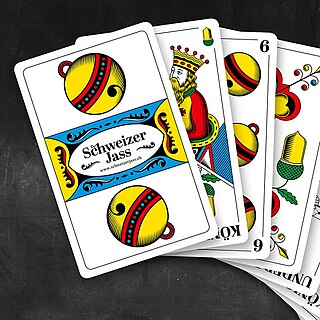
Jass is a family of trick taking, Ace-Ten card games and, in its key forms, a distinctive branch of the Marriage family. It is popular in its native Switzerland as well as the rest of the Alemannic German-speaking area of Europe, Italian South Tyrol and in a few places in Wisconsin and Ohio, USA.

Napoleon or Nap is a straightforward trick-taking game in which players receive five cards each and whoever bids the highest number of tricks chooses trumps and tries to win at least that number of tricks. It resembles a simplified version of Euchre and has many variations throughout Northern Europe. The game has been popular in England for many years, and has given the language a slang expression, "to go nap", meaning to take five of anything. It may be less popular now than it was, but it is still played in some parts of southern England and in Strathclyde. Despite its title and allusions, it is not recorded before the last third of the nineteenth century, and may have been first named after Napoleon III.

Knock-out whist or knockout whist is a member of the whist family known by a variety of names including trumps in Britain, reduction whist, diminishing whist and rat. It is often simply called whist by players who are unfamiliar with the game properly called whist. It is a basic trick-taking game and is a good way to teach the concept of tricks to children.

Dummy whist is one of many variants of the classic trick-taking card game Whist. The general rules of dummy whist are similar to that of bid whist, with two notable exceptions. Bid whist is played by four players, whereas dummy whist is played by only three. Secondly, instead of dealing a kitty, a dummy hand is dealt to be on the team of the player who wins the auction.
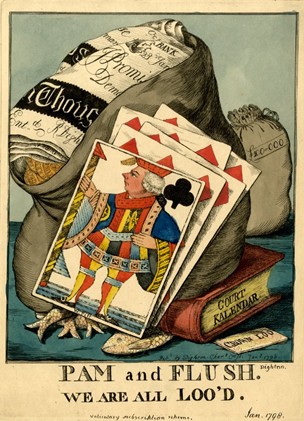
Lanterloo or Loo is a 17th-century trick taking game of the trump family of which many varieties are recorded. It belongs to a line of card games whose members include Nap, Euchre, Rams, Hombre, and Maw. It is considered a modification of the game of "All Fours", another English game possibly of Dutch origin, in which the players replenish their hands after each round by drawing each fresh new cards from the pack.
Clag is a trick-taking card game using a standard pack of 52 French-suited playing cards. It is similar to Oh Hell, and can be played by three to seven players. Clag originated in the Royal Air Force and started as an acronym for Clouds Low Aircraft Grounded.

The following is a glossary of terms used in card games. Besides the terms listed here, there are thousands of common and uncommon slang terms. Terms in this glossary should not be game-specific, but apply to a wide range of card games. For glossaries that relate primarily to one game or family of similar games, see Game-specific glossaries.

Tippen, also known as Dreiblatt, Dreikart, Drei Karten, Dreekort, Kleinpréférence or Labet, is an historical German 3-card, plain-trick game which was popular as a gambling game for three or more players. The Danish version of the game was known as Trekort and more elaborate Swedish variants include Knack and Köpknack. It appears to be related to the English game of 3-Card Loo. It was banned as a gambling game in some places.
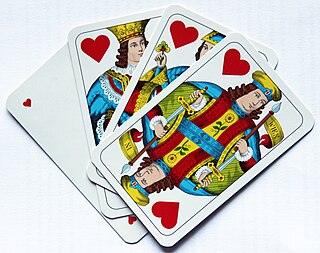
Préférence, frequently spelt Preference, is a Central and Eastern European 10-card plain-trick game with bidding, played by three players with a 32-card Piquet deck, and probably originating in early 19th century Austria, becoming the second most popular game in Vienna by 1980. It also took off in Russia where it was played by the higher echelons of society, the regional variant known as Preferans being still very popular in that country, while other variants are played from Lithuania to Greece.

Skærvindsel is a Danish card game for four players that is a member of the Schafkopf family. Today it is mostly played in Jutland and is therefore often spelled Sjervinsel, but was previously widespread throughout Denmark. It was the first Danish game where the winner of the auction, the declarer, could choose a partner by calling an Ace. This principle has since been transferred to Call-Ace Whist (Esmakkerwhist).

Call-ace Whist or Danish Whist is a card game for four players playing in variable partnerships. It is the most popular form of Whist in Denmark, where it is often just called "Whist". It has a well developed bidding system and has imported from the traditional Danish game of Skærvindsel the feature of determining the partnerships by 'calling an ace'. John McLeod records that there is also a version of Danish Whist in which there are fixed partnerships.
















